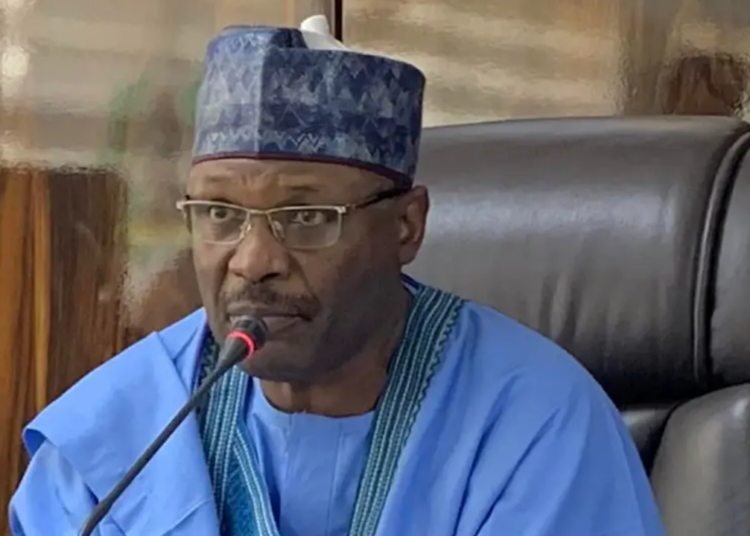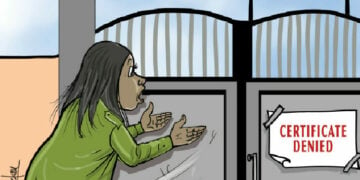Within the week, the leaked audio clip containing the alleged conversation between the founder of the Living Faith Church, popularly known as Winners Chapel, Bishop David Oyedepo, and the presidential candidate of the Labour Party (LP), Mr. Peter Obi, turned out a storm in a tea cup as the former Anambra State Governor was accused of deploying religious sentiments to garner support through church leaders, ahead of the elections that saw him coming third with a little over six million votes.
With the exception of Atiku Abubakar of the Peoples Democratic Party (PDP), both the candidates of the All Progressives Congress (APC), Asiwaju Bola Tinubu and the LP presidential candidate were regular faces in worship centres. The faith of Tinubu and Obi may be known, but their presence in mosques and churches, something they never bothered to openly show before the campaigns, became a subtle campaign to swing votes from both Muslims and Christians ahead of the crucial polls that have become disputable.
.Not many people are surprised that the Bishop Oyedepo-Obi audio clip is causing unnecessary anxiety on some social media platforms as many argue that the apprehension only serves to feed the monster of religion and entrench a season of distraction worthy of precipitating a crippling crisis in a nation that is already set on edge.
Even Atiku was not free of succumbing to some religious inclinations to cloud his sense of judgement. In the heat of the killing of Deborah Yakubu in Sokoto, on 12th May, 2022, over alleged blasphemy, the ‘Wazirin Adamawa’ deleted his tweet over the murder that attracted national and global outrage. When he came under heat over the matter, the former Customs officer said he never authourised the tweet.
In essence, religion and ethnicity have become weapons in the hands of politicians to hunt for votes. So, it was no serious matter when Obi reached out to Bishop Oyedepo to seek support for votes. Tinubu, too, spent days in Kano where he pleaded with Muslim clerics to vote for the APC on the basis of the Muslim-Muslim ticket. There is no better act that facilitated the enthronement of religious factors in politics than the decision by the APC to fly the same faith ticket.
In a nation like Nigeria where we have so many worship centres that are fast turning into business centres, but less righteousness, the Abrahamic faiths as practised in the country is increasingly becoming a veil for anything that brings personal advantages for clerics. The partisanship of religious clerics has contributed in dampening politics and injecting the blood of religion into the veins of politics.
Those who championed the same faith ticket and dispelled all fears about its fallouts were largely from the North, and supported by other politicians from other geo-political zones. In justifying the MM ticket, the pro-same faith camp recalled how the June 12 election, anchored on the same faith ticket, was largely supported and presumably won but eventually annulled.
One agency that would have stood its ground and changed the story was the Professor Mahmood Yakubu-led Independent National Electoral Commission (INEC) that promised real time upload of election results from the various polling centres on the commission’s portal. That was not to be. While INEC told anxious voters that its inability to upload real time results of the polls was due to technical glitches, Minister of Information, Alhaji Lai Mohammed on Tuesday attracted fiery anger when he said INEC’s refusal to upload election’s result real time was to avoid cyber attacks.
Deepening Nigeria’s democracy cannot be realised through the enthronement of compromised polls made obvious by the failings of the electoral commission to upload on real time outcomes of the result that threw doubts on the inviolability of votes. A compromised leadership emerging from a flawed democratic process is the worst government any country must not be cursed with.
Recent war of words over Wednesday’s alleged raiding of the Labour Party’s national headquarters in Abuja by thugs, suspected to be members of a political party, must be treated with caution. Those who should know are aware that Nigeria is passing through a period of frightening uncertainties, and the need to exercise is pertinent.
Some Nigerians with the wherewithal have already taken their families to safety abroad, while ordinary citizens with no financial powers are stuck with a nation that offers little hope for the future. The country may continue to play politics with the hope of pulling through the present darkness, but insiders know the nation’s precarious present situation must be handled cautiously.
Democracy can only be worthwhile if it promotes the general wellbeing of citizens. Even the blind can see that eight years of APC has been fraught with challenges of unimaginable magnitude. As I was writing this piece yesterday, Nigeria is still the global headquarters of poverty. Unemployment has taken the future out of Nigerian youths who are daily engaged in the search for jobs without success.
For many voters, the 2023 polls were seen as a symbol of renewed hope for our nation that has so much but given so little to her citizens. While the country gropes in the dark, the citizens are turned into a horrifying cynosure of impoverishment amidst a vast ocean of prosperity. In summing the nation’s tragedy, former President of the United States of America, Mr. Bill Clinton once said, “Nigeria is too rich to be poor but so poor to be rich”.
Can the present democratic dispensation rekindle the hope of the past? Can Nigerians, across religious and ethnic divides, walk together for a new dawn that will ensure freedom and prosperity for all? Can we look beyond the shenanigans of politicians deploying religion and ethnicity to create a nation that works for all?
These and many questions remain germane in our quest to create a nation that serves the interest of the Black race. How we manage our diversity to unite our citizens and change the poor fortunes of our country remains our major challenge.
Recapturing the essence of a better hope for Nigeria can only be possible if we join hands to make the nation work for all. A system that works for only politicians to compromise the electoral system for their selfish interest can only serve to elongate our nightmare. When religion and ethnicity are enthroned to serve the interest of the few, we inadvertently embrace the option of enthroning mediocrity for selfish aggrandisement.
There is a need for the country to take holistic measures to repair and heal our flawed systems. In a country where politicians are only willing to negotiate for their personal comforts and that of their families, there is a need to revisit the two-party system as adopted by the administration of former Military President Ibrahim Badamasi Babangida. In doing this, the doors of ethnicity and religion in politics may be permanently shut down for good.
If only we had allowed the growth of the two-party system, we would have avoided what is confronting us today. The hues and outcries over the recently concluded polls should not be allowed to threaten our democracy, but Nigeria must find out the best means of sustaining and deepening the government through the ballot. Only then, can the INEC resuscitate the confidence of voters in our nation’s democracy that received bashing during the recently concluded polls.
The past may have gone with the painful expectations, but we must not allow present frustration imposed by electoral criminals to annihilate the dreams of citizens whose thoughts for a better Nigeria has remained an abiding faith for our citizens.
The skies are still cloudy but our hope that Nigeria remains the hope of the Blackman remains the citadel of a blissful tomorrow is a reflection of a fearless but trembling faith that whatever comes and goes, the labours of our heroes past can never be in vain.
We may be experiencing a grim return of an avalanche of attacks on our community, but we believe that such attacks are only the dying moments of terror elements in the throes of death. That those who deploy wicked tools of ethnicity and religion divide for political power are set for a big fall down the precipice of irrelevance.
It is in a sick democracy that bigotry thrives. Democracy, being a process, can only be cleansed of its inherent flaws through a committed electoral umpire in collaboration with enlightened voters devoted for the common good.











